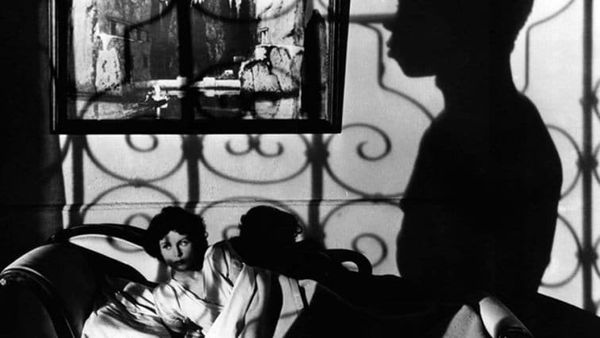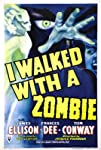Eye For Film >> Movies >> I Walked With A Zombie (1943) Film Review
I Walked With A Zombie
Reviewed by: Amber Wilkinson

Although it's not cited in the credits, the spirit - and much of the plot - of Jane Eyre wafts in along with the sound of voodoo drums in Jacques Tourneur's atmospheric horror, which marries Bronte's work to an article from Inez Wallace. The title might, to a modern ear, suggest schlock or B movie silliness but Tourneur's film, which saw him reteam with producer Val Lewton a year after the equally moody Cat People, is a melancholic and gothic-inflected tale that is haunting in the best sense of word.
Young Canadian nurse Betsy Connell (Francis Dee) is heading to Saint Sebastian in the Caribbean to care for Jessica Holland (Christine Gordon), the wife of plantation owner Paul (Tom Conway) who, though she is able to move about, appears to have no independent thought. The doctors and the islanders, needless to say, are at odds views as to what exactly might be ailing her. Against this backdrop, Betsy finds herself falling for Paul and discovering secrets that lie between him and his near-alcoholic half-brother Wesley Rand (James Ellison) and then men's mother Mrs Rand (Edith Barrett).

Not a moment goes to waste in a film, which covers ground with speed - from romance to voodoo ritual - all without resorting to cheap tricks or easy answers. As with Cat People, Tourneur also allows the sense of being an 'incomer' to permeate, in the more benign sense of Betsy, but also less attractive notions of colonialism. The chiaroscuro from cinematographer J Roy Hunt creates an almost 'cage-like' effect at the plantation, with the light from the house's screen blinds casting slats over almost everything. He and Tourneur also fully accentuate white and black, so that the women's dresses, in particular, are often stark against the night. On the island, of course, nothing is truly black and white, particularly after dark.
Other films have sought to ridicule ideas of voodoo but here the islanders' beliefs are treated with respect and the idea of zombies with an air of mystery - here personified by the looming, dead-eyed and wordless Carrefour (Darby Jones), who Betsy encounters as she tries to help Jessica. The music also gives way to excellent sound design in all the right places, the wind adding to the film's eerie sorrowfulness. Death and portent are also a constant companion, from Paul telling Betsy that the glittering water she is enamoured with from the boat sailing her to the island is caused by fish putrescence to islanders sobbing rather than celebrating at the arrival of a child. This is not a film about common or garden fears, like being afraid of the dark, something that Betsy most certainly isn't. Its success comes from the way it plays with much more deep-seated psychological anxieties about freewill, life and death.
There's also an almost metaphysical poetry to all this that goes beyond the deceptively familiar romance that provides the film's main arc, so that you think of all these ideas of love and sacrifice glittering in the night, while being haunted by the themes of tragedy and loss that have, perhaps, caused them to shine so brightly.
Reviewed on: 25 Dec 2020
















